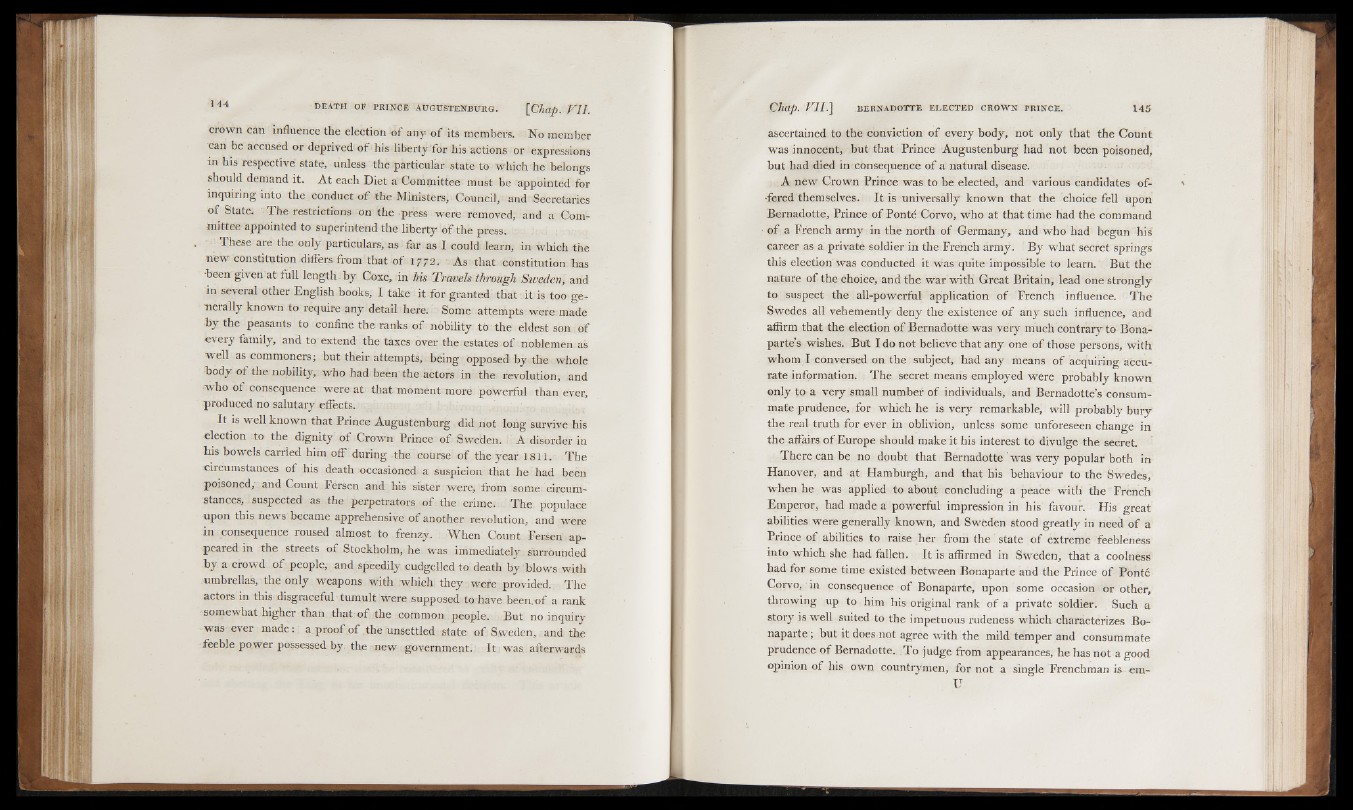
crown can influence the election of any o f its members. No member
can be accused or deprived o f his liberty Tor his actions or expressions
in his respective state, unless the particular state to which he belongs
should demand it. A t each Diet a Committee must be appointed for
inquiring into the conduct o f the Ministers,-Council, and Secretaries
of State. The restrictions on the -press were removed, and a Committee
appointed to superintend the liberty of the press.
These are the only particulars, as far as I could learn, in which the
new constitution differs from that o f 1772, As that constitution has
•been given at full length by Coxe, in his Travels through Sweden, and
in several other English books, I take it for granted that it is too generally
known to require any detail here. Some attempts were made
•by the peasants to confine the ranks of nobility to the eldest son of
every family, and to extend the taxes over the:estates of noblemen as
well as commoners; but their attempts, being opposed by the whole
body o f the nobility, who had been the actors in the. revolution, and
■who o f consequence were at, that-moment more powerful than ever,
produced no salutary effects.
It is well known that Prince Augustenburg did not long survive his
election to the dignity o f Crown Prince o f Sweden. : A disorder in
his bowels carried him off during the course of the year 1811.• The
circumstances of his death .occasioned a suspicion that he had been
poisoned, and Count Fersen and his sister were, from some; circumstances,
I suspected as the perpetrators o f the crime. The populace
-upon this hews became, apprehensive, o f another revolution, and were
in consequence roused almost to frenzy. When Count Fersen appeared
in the streets o f Stockholm, he was immediately surrounded
by a crowd of people, and speedily cudgelled to death by blows with
umbrellas, the only weapons with .which they ; were provided. The
actors in this disgraceful tumult were supposed to have been, of a rank
somewhat higher than that-of the common people. But no inquiiy
was ever made: a proof of the unsettled state of Sweden, and the
feeble power possessed by. the new government. It was afterwards
ascertained to the conviction o f every body, not only that the Count
was innocent, but that Prince Augustenburg had not been poisoned,
but had died in consequence of a natural disease.
A new Crown Prince was to be elected, and various candidates offered
themselves. It is universally known that the choice fell upon
Bernadotte, Prince o f Ponté Corvo, who at that time had the command
o f a French army in the north o f Germany, and who had begun his
career as a private soldier in the French army. By what secret springs
this election was conducted it was quite impossible to learn. But the
nature of the choice, and the war with Great Britain, lead one Strongly
to suspect the all-powerful application o f French influence. The
Swedes all vehemently deny the existence o f any such influence, and
affirm that the election of Bernadotte was very much contrary to Bonaparte’s
wishes. But I do not believe that any one of those persons, with
whom I conversed on the subject, had any means o f acquiring accurate
information. The secret means employed were probably known
only to a very small number o f individuals, and Bernadotte’s consummate
prudence, for which he is very remarkable, will probably bury
the real truth for evér in oblivion, unless some unforeseen change in
the affairs of Europe should make it his interest to divulge the secret.
There can be no doubt that Bernadotte was very popular both in
Hanover, and at Hamburgh, and that his behaviour to the Swedes,
when he was applied to about concluding a peace with the French
Emperor, had made a powerful impression in his favour. His great
abilities were generally known, and Sweden stood greatly in need o f a
Prince of abilities to raise her from the state of extreme feebleness
into which she had fallen. It is affirmed in Sweden, that a coolness
had for some time existed between Bonaparte and the Prince of Ponté
Corvo, in consequence of Bonaparte, upon some occasion or other,
throwing up to him his original rank o f a private soldier. Such a
story is well suited to the impetuous rudeness which characterizes Bonaparte
; but it does not agree with the mild temper and consummate
prudence of Bernadotte. To judge from appearances, he has not a good
opinion of his own countrymen, for not a single Frenchman is em-
U